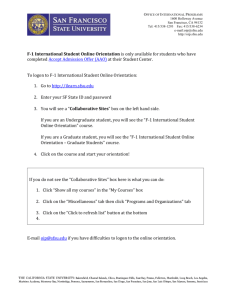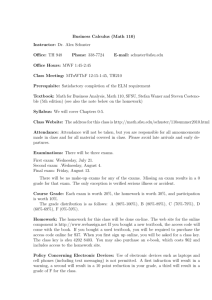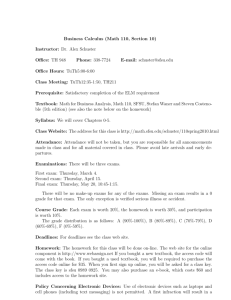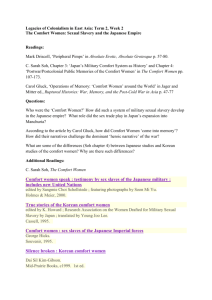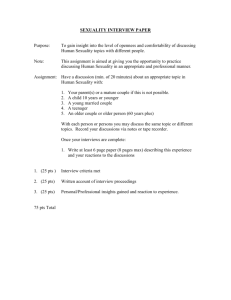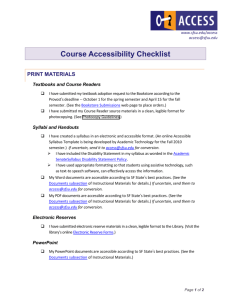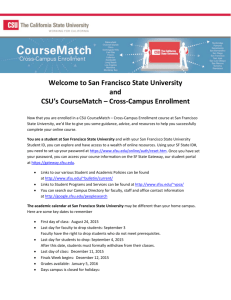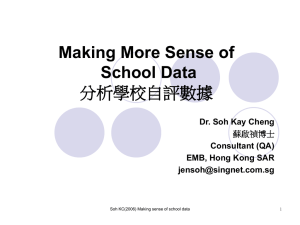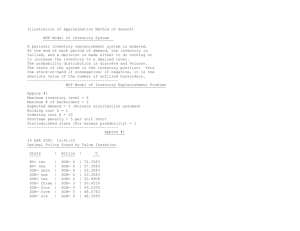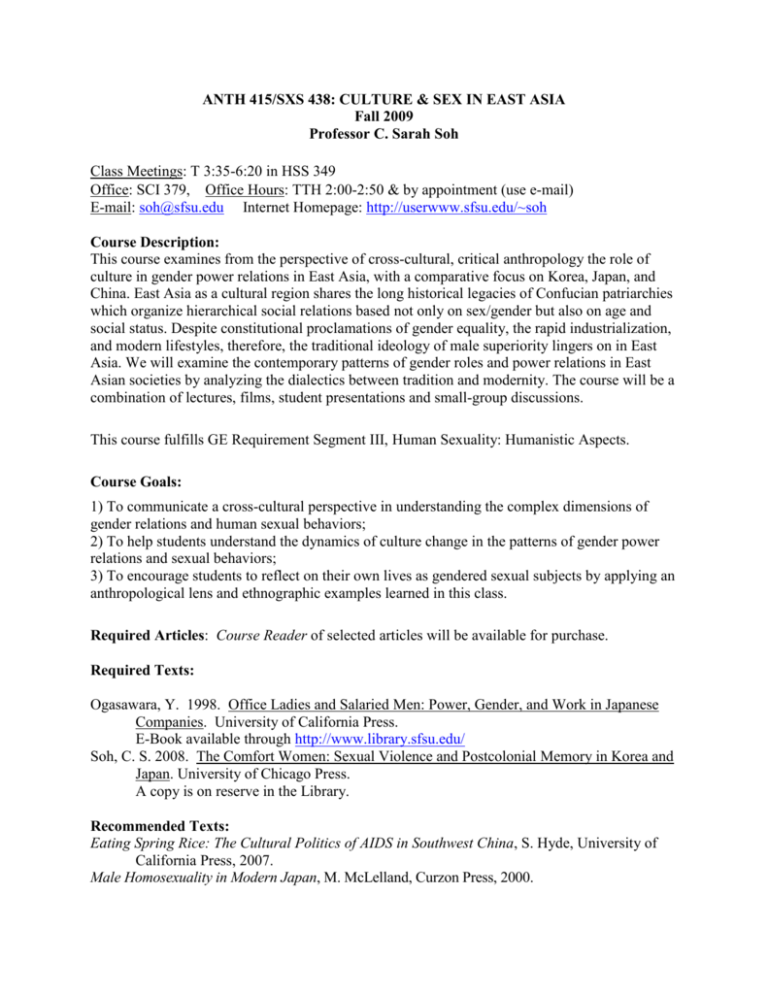
ANTH 415/SXS 438: CULTURE & SEX IN EAST ASIA
Fall 2009
Professor C. Sarah Soh
Class Meetings: T 3:35-6:20 in HSS 349
Office: SCI 379, Office Hours: TTH 2:00-2:50 & by appointment (use e-mail)
E-mail: soh@sfsu.edu Internet Homepage: http://userwww.sfsu.edu/~soh
Course Description:
This course examines from the perspective of cross-cultural, critical anthropology the role of
culture in gender power relations in East Asia, with a comparative focus on Korea, Japan, and
China. East Asia as a cultural region shares the long historical legacies of Confucian patriarchies
which organize hierarchical social relations based not only on sex/gender but also on age and
social status. Despite constitutional proclamations of gender equality, the rapid industrialization,
and modern lifestyles, therefore, the traditional ideology of male superiority lingers on in East
Asia. We will examine the contemporary patterns of gender roles and power relations in East
Asian societies by analyzing the dialectics between tradition and modernity. The course will be a
combination of lectures, films, student presentations and small-group discussions.
This course fulfills GE Requirement Segment III, Human Sexuality: Humanistic Aspects.
Course Goals:
1) To communicate a cross-cultural perspective in understanding the complex dimensions of
gender relations and human sexual behaviors;
2) To help students understand the dynamics of culture change in the patterns of gender power
relations and sexual behaviors;
3) To encourage students to reflect on their own lives as gendered sexual subjects by applying an
anthropological lens and ethnographic examples learned in this class.
Required Articles: Course Reader of selected articles will be available for purchase.
Required Texts:
Ogasawara, Y. 1998. Office Ladies and Salaried Men: Power, Gender, and Work in Japanese
Companies. University of California Press.
E-Book available through http://www.library.sfsu.edu/
Soh, C. S. 2008. The Comfort Women: Sexual Violence and Postcolonial Memory in Korea and
Japan. University of Chicago Press.
A copy is on reserve in the Library.
Recommended Texts:
Eating Spring Rice: The Cultural Politics of AIDS in Southwest China, S. Hyde, University of
California Press, 2007.
Male Homosexuality in Modern Japan, M. McLelland, Curzon Press, 2000.
ANTH 415 / Soh
Page 2
Course Requirements: Prerequisite: ANTH 120 and upper division standing.
1. Attendance and Participation: (10 pts).
Regular attendance and active participation in class discussions are expected at every class.
Bring the weekly assigned texts/readings to each class. Pop quizzes and unannounced
homework may be given any time, and will be graded. Students who missed them four times
(including medical excuse absences) will be dropped from the class and given an F.
2. Class presentation (10 pts): You are responsible to sign up in advance. Give a brief (no more
than ten minutes) presentation on specific aspects of assigned works, other relevant materials,
or media reports on East Asian cultures. In order to effectively incorporate current events into
course discussions, you are required to read daily newspapers and monitor the international
press for materials relevant to this course. You must submit a summary—double-spaced and
no more than two-page—of the main point of your presentation at the start of class.
Your presentation should be given as a member of Student-Initiated Panels (SIP). The SIP
topics should be assigned among the panel members prior to class presentations. The topic
may be either from among the week’s reading list or students’ own cross-cultural comparison
reports (CCR) on related issues. CCR will consist of students’ analytical comments on the
themes of the given week’s topics, deriving from comparisons between either Anglo-American
mainstream culture or a minority ethnic culture in the United States with those of East Asian
cultures. The purpose of the CCR exercises is to promote the course goals stated above.
3. 2 Take-home Exams (2 x 20 pts = 40 pts): Exams will consist of identification and short
answer questions.
4. Research paper (35 pts) + In-class oral report on it (5 pts): Research topics and methodology
must be approved by the instructor. Abstracts of research proposals are due in class by the 5th
week (9/22/09). Sign up for a brief class presentation of your research by the end of the 11th
week (11/3/09). Student research presentations will be held during the 12th and 13th weeks
(prior to the Thanksgiving Recess week). The research paper is to be 10 double-spaced pages
(15 pages for graduate students) and due by the last class (12/1/09).
Grading Policy: Grading of the papers will be based on the organization, clarity, and logic of
presentation; supportive evidence adduced for the argument; and the appropriateness and
originality of conclusions. No plagiarism is tolerated. Anthropology Department regards
submitting a paper that is the same or substantially the same as one submitted for credit in
another course to be an act of academic misconduct. Students may receive no credit for any
recycled papers or duplicated assignments.
Final course grades will be calculated according to the following range of total points.
A 100~95
A- 94~90
B+ 89~87
B 86~83
B- 82~80
C+ 79~77
C 76~73
C- 72~70
D+ 69~67
D 66~63
D- 62~60
F 59 & below
NB: There are no make-ups on missed quizzes.
Electronic submissions and/or late assignments will not be accepted unless I approve ahead of time
under exceptional circumstances. Please plan to meet the deadlines specified.
All written assignments must be typed, double-spaced, using 12-point font and 1" margins all
around. Any written assignments not following the style and format will be subject to a
markdown by one full letter grade (e.g., “A” to “B”; “B” to “C”, etc.).
The syllabus is your guide to the course and is subject to changes and adjustments.
ANTH 415 / Soh
Page 3
SCHEDULE
I. Sex Differences & Gender Roles in East Asia: An Overview
1 8/25/09 Introduction
Sign up for class presentations.
Film & Homework on “Chunhyang”
2 9/1 Perspectives on Sex/Gender and Power
"The Origins of Sex Differences in Human Behavior: Evolved Dispositions Versus Social
Roles." American Psychologist 54(6): 408-423, Eagly and Wood (1999)
“‘Husband Is to Wife as Heaven Is to Earth’: Nature and Culture in Sex/Gender Relations
in Korean Society.” Soh (1999), paper presented at the 121st American Ethnological
Society annual meetings, Portland, Oregon.
“Foot-Binding in Neo-Confucian China and the Appropriation of Female Labor.” Blake
(2000), in L. Schiebinger, ed., Feminism and the Body, Oxford University Press.
“What Is Women’s Language?” Inoue (2006), in Vicarious Language: Gender and
Linguistic Modernity in Japan, University of California Press.
Film: Nu Shu
(September 11 …….Last day to drop classes without receiving a “W” grade)
3 9/8 SFSU Fixed State Budget Closure Day [No Class/ Self-study for 9/15 class]
State Feminism & Capitalist Consumerism in China
“The Impact of the Marriage Law of 1950.” Ono (1989), in Chinese Women in a Century
of Revolution. Stanford University Press.
“From Gender Erasure to Gender Difference: State Feminism, Consumer Sexuality, and
Women’s Public Sphere in China.” Yang (1999) in M. Yang, ed., Spaces of Their Own.
University of Minnesota Press.
II. Gender Roles & Power Relations: Change and Continuity
4 9/15 Courtship and Marriage: Traditional versus Modern
“Transformations: The Construction of Courtship in Twentieth-Century Korea.”
Kendall (1996), in Getting Married in Korea, University of California Press.
“Haruko and Shō-ichi.” Bernstein (1996), in Haruko’s World. Stanford University
Press.
“Making Up the Bride.” Adrian (2003), in Framing the Bride: Globalization, Beauty and
Romance in Taiwan’s Bridal Industry, University of California Press
Film: Through Chinese Women’s Eyes
ANTH 415 / Soh
Page 4
5 9/22 Gender and Work I
“Introduction; The Japanese Labor Market and Office Ladies; Why Office Ladies Do
Not Organize; Gossip.” Ogasawara (1998), in Office Ladies and Salaried Men,
University of California Press.
“Fathers and Daughters: Paternal Influence among Korean Women Legislators.” Soh
(1993), Ethos: Journal of the Society for Psychological Anthropology 21(1): 55-78.
6 9/27 Gender and Work II
“Popularity Poll; Acts of Resistance; Men Curry Favor with Women; Conclusion.”
Ogasawara (1998), in Office Ladies and Salaried Men, University of California Press.
“Gender Construction in the Offices of a South Korean Conglomerate.” Janelli and Yim
(2002), in L. Kendall, ed., Under Construction, University of Hawaii Press.
Film: Small Happiness
Research proposal abstracts due
EXAM 1 (Take-home) distributed
III. Gender, Class, and Sexuality in Patriarchal Cultures
7 10/6 Performativity of Gender and Sexuality
EXAM 1 DUE at the start of class
"Staging Androgyny." Robertson (1998), in Takarazuka: Sexual Politics and Popular
Culture in Modern Japan. University of California Press.
“A Type of Woman.” Allison (1994), in Nightwork: Sexuality, Pleasure, and Corporate
Masculinity in a Tokyo Hostess Club. University of Chicago Press.
“Commodified Romance in a Tokyo Host Club.” Takeyama (2005), in M. McLelland and
R. Dasgupta, eds., Genders, Transgenders and Sexualities in Japan. Routledge.
Film: Onnagata / Dream Girls
8. 10/13 Gender and Sexuality in Patriarchal Cultures
“Homosexuality in Japanese History.” McLelland (2000), in Male Homosexuality in
Modern Japan. Curzon Press.
“In Love and Gay.” Geyer (2002), in P. Link, R. P, Madsen, and P. G. Pickowicz, eds.,
Popular China. Rowman & Littlefield.
“The Wedding Banquet Revisited: ‘Contract Marriage’ between Korean Gays and
Lesbians,” Cho (2009), Anthropological Quarterly, 82 (2): 401-422.
Film: The Wedding Banquet
ANTH 415 / Soh
Page 5
9. 10/20 Representations and Narratives of the “Comfort Women”
“Introduction; From Multiple Symbolic Representations to the Paradigmatic Story;
Korean Survivors’ Testimonial Narratives.” Soh (2008), in The Comfort Women.
University of Chicago Press.
Film: Silence Broken: Korean Comfort Women
(October 20……….Last day to request CR/NC grading option)
10. 10/27 Legacies of Historical Institutions
“Geisha Parties; The Elusive Geisha.” L. Dalby (1998), in Geisha, University of
California Press.
“Japan’s Military Comfort System as History; Public Sex and the State.” Soh (2008), in
The Comfort Women. University of Chicago Press.
EXAM 2 (Take-home) distributed
11. 11/3 SFSU AY Faculty Scheduled Furlough Day [No Class]
Memories of and Justice for Japan’s Wartime Comfort Women [Self-study]
“Postwar/Postcolonial Memories of the Comfort Women; Private Memories of Public
Sex; Epilogue.” Soh (2008), in The Comfort Women. University of Chicago Press.
12. 11/10 Student research presentations
EXAM 2 DUE at the start of class
13 11/17 Student research presentations
(November 19 ….Last day to withdraw from course without documents)
14 11/24
Thanksgiving Week [No Class]
15 12/1
Last class
RESEARCH PAPERS DUE at the start of class: 12/1/09
16 12/8
SFSU AY Faculty Scheduled Furlough Day [No Class]
***
More on Course and SFSU Policies:
I will be using iLearn to post all handouts. Any in-class announcements will be made at the
beginning of the class and will not be repeated. Check the iLearn class page at least once a week
for any new information in the weekly sections. (You can access iLearn by going to:
http://ilearn.sfsu.edu/login/index.php. Log in using your student ID and PAC.)
All electronics (including cell phones and laptops) must be turned off at the start of class.
Students with disabilities should contact the Disability Programs and Resource Center (3382472). All students in the course are expected to adhere to a code of academic integrity and to
the University standards for student conduct, http://www.sfsu.edu/~bulletin/current/suppreg.htm#ppg339.

